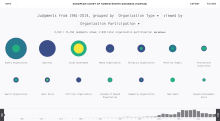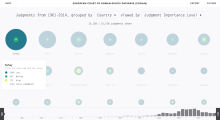New data provided by professor Rachel Cichowski shows an increase in third party interventions among several groups using the European Court of Human Rights to mobilize for change.
Cichowski is a professor of political science and law, societies and justice at the University of Washington. Her research revolves around comparative and international law, legal mobilization, and social movements.
Cichowski’s most recent project focuses on learning how interest organizations, activists and people mobilize courts and litigation processes to bring social, policy, and legal change.
Cichowski identified one of the biggest challenges facing the European Court of Human Rights as the court struggling to handle that caseload in terms of enforcing decisions and following up on those decisions with member states across Europe.
To achieve this, Professor Cichowski and Elizabeth Chrun, Professor of Political Science at McGill University, examined over 21,000 judgements made by the European Court of Human Rights over the course of 1961 through 2014.
Between 1961 through 2014, there was a large increase in participation by human rights organizations.
“I want my research to bring light to the magnitude of this participation and what this means to the court.” Cichowski said.
The data illuminated the unexpected trend of businesses ranking second in total filings for human rights claims.
“They are taking up a lot of the court's caseload.” Cichowski said. “It poses an empirical and theoretical question of whether that’s what the court intended for.”
After gathering this information, each datapoint was individually hand-coded to create a data visualization tool. The data visualization tool was incorporated to make the research accessible to everyone.
“I wanted to create a way in which the data would be accessible and people could see what was going on easily.” Cichowski said.
This data can be used for several different purposes: to educate audiences with varied levels of understanding, to provide scholars with information on how these institutions work, and for practical purposes so lawyers, judges, policy makers, and activists can use this data to improve the systems.
Although the data is objective, Professor Cichowski brings humanity to her research by engaging with the communities involved in this court system. By interviewing those who interact with the court – judges, organizations, and activists – she is able to learn more about the needs of the community.
“These groups are a datapoint… but those are real people behind the data.” Cichowski said.
The new data from 2015 to 2020 shows how the third party intervention has begun to skyrocket, meaning that both more people and different types of groups are filing rights briefs in the European Court of Human Rights.
There are both benefits and drawbacks to the increase of briefs filed. On the positive side, more voices are able to share experiences with human rights violations. Conversely, an open system that allows third party intervention can politize cases.
“One of the nicest parts has been doing interviews with judges and activists and becoming a part of a network of socio legal scholars, human rights groups, and lawyers and getting to know them and being of use to them.” Cichowski said. “It’s also been really fulfilling to become a mentor to students.”
Currently, Professor Cichowski is teaching an undergraduate seminar where she teaches students how to create their own databases based on the one she is constructing. Most of these students go on to present their projects at the Undergraduate Research Symposium at the University of Washington.
Cichowski loves to see students become social scientists and examine how data can be used, understand where it comes from, look at the stories behind it and engage with the people you are studying. By doing this, students are able to get a more holistic understanding of how to connect the data to the community’s needs.
For future data collection, Cichowski hopes to work with computer scientists to use machine learning techniques and algorithms to code data, instead of hand coding each data point.
Accessibility and transparency are what Professor Cichowski hopes her research will bring both petitioners and the court system. Ultimately, she also hopes her research can inform court reforms to create a more manageable caseload.

